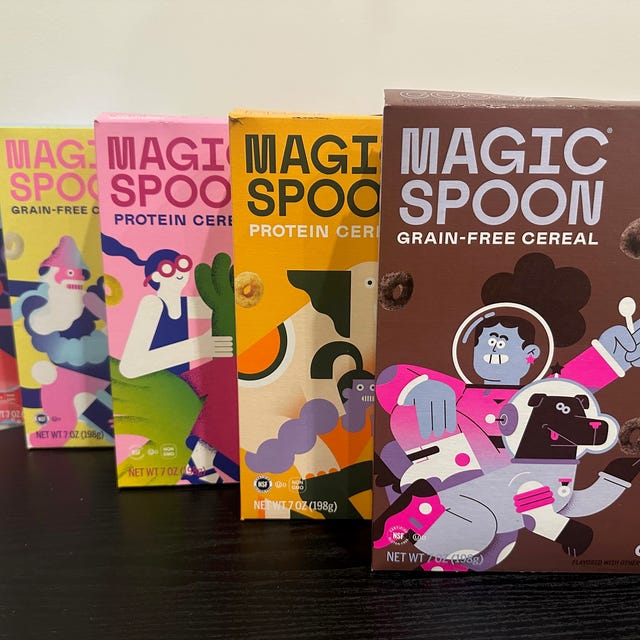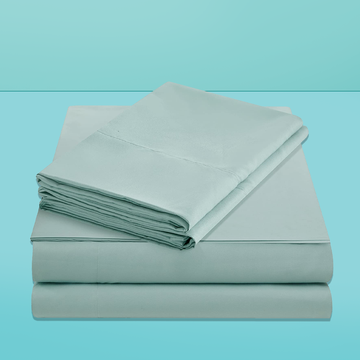Cereal was my go-to breakfast growing up—and often my favorite midnight snack. I loved the sweet crunch of the classics, but as an adult (and a dietitian!), I’ve become more mindful of what I eat, and sugary cereals don’t quite align with my health goals anymore. Magic Spoon promises to reimagine childhood favorites with a healthier spin: low-carb, high-protein and gluten-free. With its bold claim of being a guilt-free treat, I was curious to see if it could truly recreate the taste I loved as a kid while meeting my dietary needs. Naturally, I had to put it to the test, so I tried six of their flavors—Fruity, Frosted, Cocoa, Peanut Butter, Blueberry Muffin and Cinnamon Toast (they also offer Chocolate Chip Cookie and Birthday Cake flavors).
Founded in 2019 by two college friends, Magic Spoon offers a fun and health-conscious breakfast. In this review, I’ll break down the taste, texture, ingredients and whether or not this cereal is worth adding to your pantry.
What sets Magic Spoon apart?
Each 1 cup serving of Magic Spoon cereal boasts:
- 140–170 calories
- 12–14 grams of protein
- 10–15 grams of carbohydrates
- 1–2 grams of fiber
- 0 grams of sugar
- No artificial ingredients
- Grain-free (no wheat, rice, or soy)
Magic Spoon is definitely making waves in the cereal world. Each 1-cup serving packs 140–170 calories and 12–14 grams of complete protein, which is a significant upgrade compared to traditional cereals that typically have just 2–5 grams of protein per serving.
The biggest win is the 0 grams of sugar per serving, a huge difference compared to classic cereals, which often contain more than 10 grams of sugar. Magic Spoon uses monk fruit and allulose as sweeteners, which may help avoid sugar crashes, though they may not be for everyone. If you're cutting back on sugar and open to alternative sweeteners, this brand hits the mark.
In addition to its impressive protein and sugar profile, Magic Spoon is gluten-free and grain-free, with no wheat, rice or soy. It's also free of artificial ingredients, making it a great choice for those with dietary restrictions or looking for a simpler breakfast option.
Is Magic Spoon actually better for you?
Magic Spoon's ingredient list is simple and straightforward. Each flavor is crafted with a base of milk protein blend: casein and whey protein concentrate, sweeteners like allulose and monk fruit extract and a blend of high-oleic sunflower oil and avocado oil. Additional ingredients, including tapioca starch, inulin, salt and natural flavors, give it its distinct texture and taste. What stands out is that ingredients like turmeric extract, spirulina extract and peanut extract are used in some of the flavors, with vegetable juice providing natural color — an excellent alternative compared to other cereals that often rely on artificial colorings and additives. The combination of allulose and monk fruit helps keep the cereal sweet without raising blood sugar levels, making it a solid low-carb choice.
For some, Magic Spoon can be a better-for-you option. It’s a great fit for those seeking a gluten-free cereal, a low-sugar alternative or a convenient source of protein in the morning. However, for those without conditions like celiac disease, whole grains remain a nutritious choice, providing fiber and essential nutrients. Also, those with sensitive digestion should take note: While allulose, monk fruit and inulin are generally safe for most people in moderate amounts, they can cause bloating or cramping in some individuals, particularly those with digestive sensitivities. It's a good idea to start with a smaller serving to assess personal tolerance.
This cereal brand offers a unique twist on breakfast, but it does fall short in some areas compared to traditional cereals. While many cereals are fortified with calcium and iron, Magic Spoon contains noticeably lower amounts of these minerals. Additionally, there's no vitamin D, a nutrient commonly found in most classic breakfast options. If you're accustomed to getting a boost of these essential nutrients from your morning bowl, this absence may be noticeable.
How much does Magic Spoon cost?
The catch is that Magic Spoon isn’t exactly budget-friendly. A variety pack of six boxes costs $54, which works out to $9 per box or $1.80 per serving. For comparison, most traditional cereals typically cost around $4–$5 per box (12 servings), or about $0.33–$0.42 per serving. While Magic Spoon is definitely a splurge, some may find the added protein and higher-quality ingredients worth the extra cost.
My thoughts on each flavor
I tried these flavors with and without unsweetened almond milk, and here's how each one ranked for me:
- Peanut Butter: My absolute favorite. It’s rich, nutty, crunchy and indulgent without being overly sweet. It reminded me of Reese’s Puffs, but with much less sugar. While it tasted great on its own, this flavor definitely improved with milk. Plus, it has the highest protein content — 14 grams — so it’s a winner all around.
- Cocoa: A close second. It gave off serious chocolate milk vibes when paired with almond milk. The sweetness was more restrained compared to traditional cocoa cereals, but it still hit the spot. It felt like the grown-up version of Cocoa Puffs or Cocoa Pebbles, which was a nostalgic win for me.
- Cinnamon Toast: Perfect for anyone who loves the warmth of cinnamon. It’s less sweet than expected, but still flavorful. This one reminded me of Cinnamon Toast Crunch, but with a more subtle sweetness.
- Fruity: This flavor definitely brought me back to childhood, with a vibe similar to Froot Loops but without the overwhelming sweetness. Even though I wasn’t a big fan of Froot Loops, if you were, this one’s probably right up your alley. The use of turmeric and spirulina extract for color is a neat touch and makes it stand out a little. The flavor itself was fruity but not as intense as traditional fruit cereals.
- Blueberry Muffin: The blueberry flavor didn’t feel as fresh or natural as I expected, and I noticed a slight aftertaste that didn’t sit well. However, it has a unique twist that some may enjoy. While it wasn’t my favorite compared to the others, it's still worth trying for those who love blueberry-flavored cereals.
- Frosted: A solid, familiar flavor reminiscent of classic frosted cereals. It didn’t stand out as much as the others for me, and I noticed a mild aftertaste that made it less exciting. Still, a reliable choice for those craving something traditional.
The bottom line: Is Magic Spoon worth it?
If you're after a cereal that delivers on high protein, low carbs and zero sugar, Magic Spoon certainly stands out. It's a solid choice for anyone looking for a more nutritious alternative to traditional cereals. That said, it's sweetened with monk fruit and allulose, which might not suit everyone, particularly those sensitive to these sweeteners. Some flavors also had a mild aftertaste, so that's worth keeping in mind. The ingredients lean more natural than many conventional cereals, but it’s lower in added vitamins and minerals, so you'll want to find other sources for nutrients like calcium or vitamin D. Pairing it with milk — dairy or fortified plant-based — can help you get a dose of those nutrients, though it might not completely fill the gap. Another consideration is the price: It’s definitely on the pricier side, especially if you're used to more budget-friendly options.
Would I buy it again? As someone who isn’t the biggest cereal fan, probably not for everyday use—but I do appreciate the convenience it offers. If I was ever craving something quick and satisfying, the Peanut Butter and Cocoa flavor would definitely be my picks. Overall, Magic Spoon offers a nice balance of nostalgic flavors with a modern, health-focused twist. I’d recommend trying the variety pack to find your favorite. That said, while it's a great option for some, there are other ways to get protein and enjoy quick, low-carb breakfasts if you’re not a cereal person.
Why trust Good Housekeeping?
At the Good Housekeeping Institute, we thoroughly test a variety of food products to ensure they meet the highest standards. For Magic Spoon cereals, we assessed key factors such as taste, texture, nutritional value and convenience. Over several weeks, we evaluated how these cereals compare to others in terms of quality, flavor, nutrition and overall performance.
Valerie Agyeman, a women’s health dietitian with more than 10 years of combined experience in nutrition communications, clinical nutrition and corporate wellness, applied her expertise to the hands-on testing process. At the Good Housekeeping Institute Nutrition Lab, she has played a key role in evaluating and testing a wide range of food and beverage products, including smoothies, snacks, supplements and baby food.

Valerie Agyeman (she/her) is a women's health dietitian and the host of the Flourish Heights podcast, where she produces science-driven content covering overlooked nutrition, wellness and women’s health topics. She has over 10 years of combined nutrition communications, corporate wellness and clinical nutrition experience. Valerie is a trusted expert in the media, regularly appearing on networks such as Fox 5 DC, PIX-11, and ABC’s Good Morning Washington. She is also a contributing expert to publications like Women’s Health Magazine, Prevention, Good Housekeeping, and The Everygirl.
Rachel Lustgarten (she/her), M.S., R.D., C.D.N., is a registered dietitian in clinical practice in New York City. Her primary area of focus is medical nutrition therapy and weight control. Rachel’s passion is sharing her knowledge and expertise of food and nutrition’s role in overall health and wellness. She co-hosts the weekly “Primary Care Medicine” show on SiriusXM Doctor Radio, interviewing expert guests and fielding listener calls and questions about hot topics in health and nutrition. She served as a clinical dietitian at the Comprehensive Weight Control Center at Weill Cornell Medicine and served as an Advisor to the Weill Cornell’s Women’s Nutrition Connection monthly newsletter for 10 years. Rachel received a Master’s degree in Clinical Nutrition from New York University, graduating with honors.

















